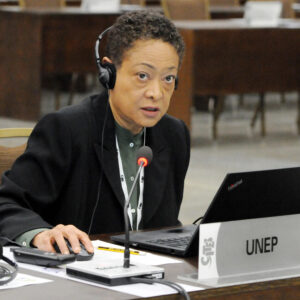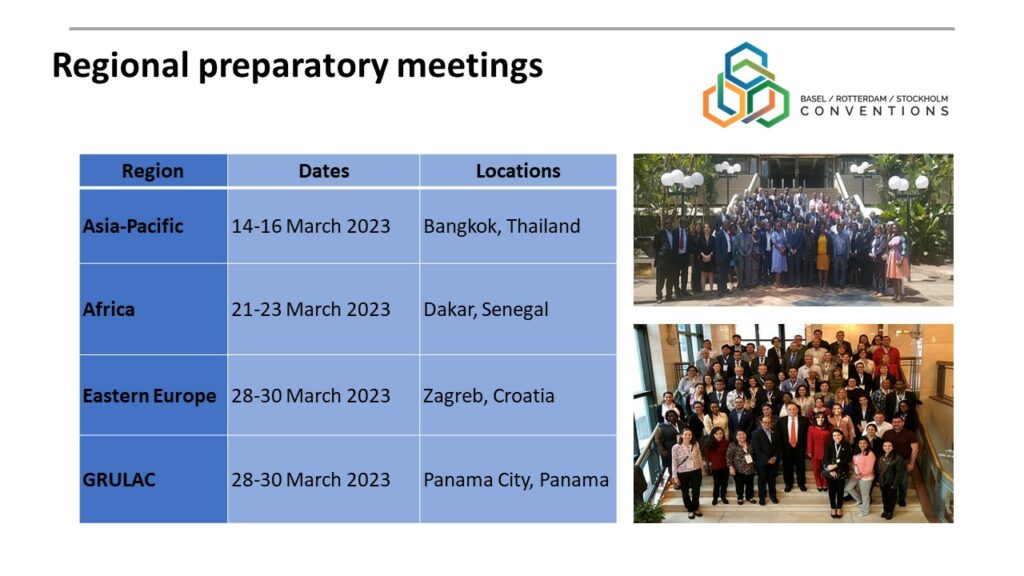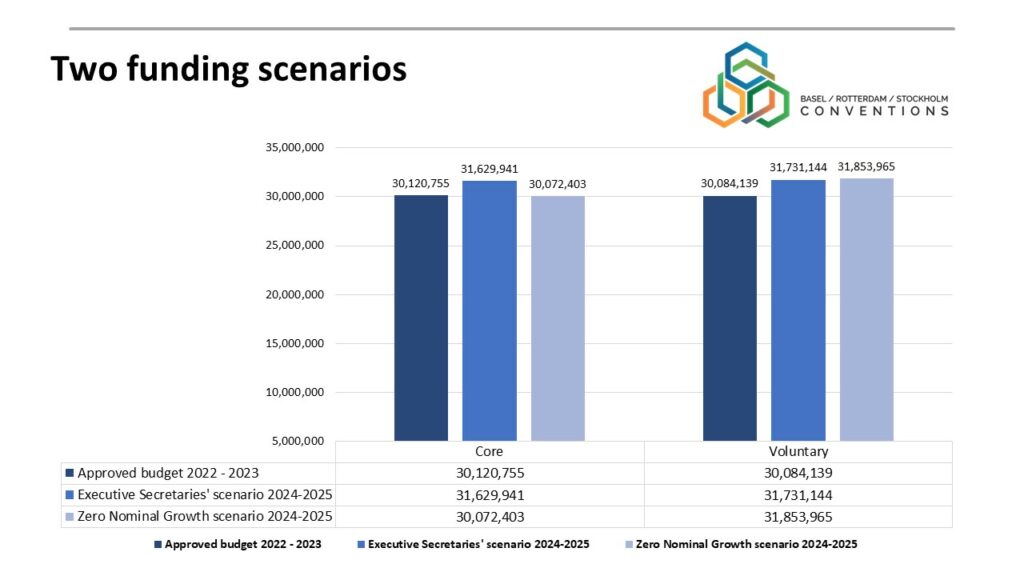Event Conference
Briefing on the 2023 Meetings of the Conferences of the Parties to the Basel, Rotterdam and Stockholm Conventions

07 Mar 2023
10:00–12:00
Venue: International Environment House & Online | Webex
Organization: Basel, Rotterdam and Stockholm Conventions
This briefing, organized within the framework of the Geneva Environment Network, provided an update on the preparations for the upcoming 2023 Meetings of the Conferences of the Parties to the Basel, Rotterdam and Stockholm Convention.
About this Session
The sixteenth meeting of the Conference of the Parties to the Basel Convention (BC COP-16), the eleventh meeting of the Conference of the Parties to the Rotterdam Convention (RC COP-11) and the eleventh meeting of the Conference of the Parties to the Stockholm Convention (SC COP-11) will be held in Geneva, from 1 to 12 May 2023.
The theme of the triple COPs will be “Accelerating action: targets for the sound management of chemicals and waste”. The meetings will be organized back-to-back and will include joint sessions on joint issues.
This event, held a few weeks ahead of the meetings, provided updates on the preparations of the triple COPs.
Speakers
By order of intervention.

Marylene BEAU
Programme Officer, Basel, Rotterdam and Stockholm Conventions

Gundega TRUMKALNE
Chief, Funds Management, Administration and Human Resources Branch, Basel, Rotterdam and Stockholm Conventions

Kathleen CREAVALLE
Deputy Director, Corporate Services Division, United Nations Environment Programme
Video
Live on webex
Live in the room
Highlights
Summary
Welcome and Introductory Remarks
Rolph Payet | Executive Secretary, Basel, Rotterdam and Stockholm Conventions
I would like to highlight the intense intersessional work that has paved the way towards the successful meetings leading up to the 2023 COPs in three months.
In our last briefing in December 2022, the BRS secretariat has organized and facilitated at least 8 meetings to make progress on various topics such as Polychlorinated biphenyl (PCB) elimination, development of technical guidelines on plastics and e-waste, prevention of illegal traffic of waste, review of the annexes of the Basel Convention, among other trainings and consultations, including our Chairs training.
The BRS secretariat has also contributed to the global governance of hazardous chemicals and waste by actively engaging in the sessions of the intergovernmental negotiations committee (INC) on developing an international treaty on the legally binding instrument on plastic pollution, the resumed session of the open-ended working group (OEWG) of the science policy panel (OEWG 1.2 – SPP CWP), and the resumed session of the fourth meeting of the intersessional process considering the Strategic approach and some management of chemicals and waste Beyond 2020 (IP4).
I would like to thank the governments of Germany and Switzerland for funding the regional preparatory meetings of the BRS COPs, which will be taking place during this month. We also have financial contributions of the governments of China Denmark, Japan, Norway, Sweden, Switzerland and the Netherlands for funding the participants travel, and the organizing of the 2023 BRS COPs.
We also have a few pledges, and I would like to reiterate again our call, especially to donors, to continue making pledges for the upcoming COPs as we need more resources.
Presentations by the Secretariat
Update on preparations for the 2023 meetings of the conferences of the Parties to the Basel, Rotterdam and Stockholm conventions
Marylene BEAU | Programme Officer, Basel, Rotterdam and Stockholm Conventions
Meeting Highlights | BC COP-16, RC COP-11 and SC COP-11. Meeting website includes more details and documents.
- 1-12 May 2023, Geneva International Conference Centre (CICG), Geneva, Switzerland
- 30 April 2023: preparatory meetings (regional groups, bureaux)
- Theme: “Accelerating action: Targets for the sound management of chemicals and wastes”
- The meetings will be conducted face-to-face, with no provision for online participation.
- No high-level segment.
- COP Presidents: Reggie Hernaus, BC | Ana Berejiani, RC | Keima Gardiner, SC
- A PCB Fair will be held from 3-5 May, to highlight efforts to accelerate the reach of targets under the Stockholm Convention 2025-2028 on the elimination of PCBs.
- Side events will be organized in lunch time and evenings.
Registration and Credentials | Representatives of Parties were invited to register, including those who require financial assistance, by 20 January 2023. The Secretariat has received a number of requests.
Admitted observers invited to register by 24 March 2023. Bodies or agencies not previously admitted as observers need to complete procedure for admission before registration by same deadline.
On-site registration:
- 10 am to 5 pm on Sunday, 30 April 2023
- 8 am to 5 pm on Monday, 1 May 2023
- 9 am to 5 pm during other days
Credentials for Parties representatives must be submitted to the Secretariat if possible no later than 24 hours after the opening of the meetings (by 10 a.m. on Tuesday, 2 May 2023). Advanced submission of electronic copies of credentials by 7 April 2023. Originals must be submitted at the meeting venue.
Tentative Schedule | The schedule generally follows past COPs schedules.
The Bureaux identified the need to have certain Convention-specific sessions early.
- Early SC and BC sessions on Monday, 1 May 2023
- Early RC session on Wednesday, 3 May 2023
These are important to note for scheduling the travels of representatives.
Potential Contact & Other Groups | The number of contact groups running in parallel will need to be limited so that all delegates can participate in the discussions.
Guidelines for rules of conduct for meeting participants | These guidelines were prepared by the Secretariat to ensure an orderly running of COPs meetings and subsidiary body meetings:
- Guidelines on the use of cameras and audio/video recording devices by participants
- Guidelines for the participation of representatives of observers
- Guidelines on preventing and addressing all forms of harassment
We’ve seen an increase in number of people getting harassed, and we would like to emphasize that action will be taken should cases come up.
Gender Representation | We remind Member States that we also need to ensure adequate gender representation and balance.
Regional preparatory meetings | Preparatory meetings are also being prepared for UN regions.

Attendance of observers is at the discretion of the organizers of the regional meetings. Many times, they have closed meetings wherein even the secretariat is not allowed in.
Preparatory webinars | A series of online webinars will be organized to brief interested delegates information on the preparations for COPs 2023.
- 18 April, 10:00 – 11:00 CET | English
- 18 April, 16:00 – 17:00 CET | Spanish
- 19 April, 16:00 – 17:00 CET | English
- 20 April, 10:00 – 11:00 CET | French
Overview of key items on the provisional agendas of the meetings
David OGDEN | Chief, Governance Branch, Basel, Rotterdam and Stockholm Conventions
This will provide an overview of what issues will be tackled for the three Conventions. They are now available on the website.
Focus on budget issues, including the proposal by UNEP to amend the memorandums of understanding between respective conferences and UNEP, and Rotterdam Convention and FAO concerning the arrangements for the provision of Secretariat functions of each Convention
Gundega TRUMKALNE | Chief, Funds Management, Administration and Human Resources Branch, Basel, Rotterdam and Stockholm Conventions
Budget documents | The first document is available in the six official languages of the United Nations while the other two are available only in English. Documents are available on the BRS website.

Essential activities are funded from the general trust funds, meaning core funds, while all other activities will continue to be funded from the voluntary funds and implementation will be subject to the availability of resources.
Budget documents developed jointly for the three conventions include two funding scenarios:
- Executive secretary scenario not exceeding a five per cent increase above the 22/23 approved budget.
- The zero nominal growth scenario maintains the operational budget at the 22/23 level in nominal terms.

For 2024-2025, the zero nominal growth scenario remains at approximately the same level, slightly lower, as the approved operational budget for 2022-23 is roughly 31.1 million, while the executive secretary scenario does not exceed five per cent when compared with the approved 22/23 budget and presents an approximately 1.5 million increase over the approved operation additional budget for 2022-2023.
Major areas of clarification | These are the services provided by UNOG on behalf of UNEP the BRS Secretariats.
- Medical and counseling services for the BRS staff service;
- Host Country relations related to diplomatic services (UNLP, CDL, diplomatic license plates, petrol cards);
- Mail and diplomatic pouch services;
- Security and safety.
Implications of the changes to the budget
- The proposed amendments will clarify which services provided to the BRS Secretariat should be covered by the UNEP’s share of the PSC costs and will not result in fewer services provided to the BRS Secretariat.
- In principle approving the amendment will not result in additional costs to the parties since these costs were already being absorbed by the BRS Secretariat before 2022 as part of the core budget (except for the 2022 – 2023 budget when they were excluded). It should be noted that some of the cost categories, e.g., security, have continued to increase over the years.
- These services have been included in both budget scenarios for 2024 – 2025 (Executive Secretaries’ scenario and the Zero nominal growth scenario).
Kathleen CREAVALLE | Deputy Director, Corporate Services Division, UN Environment Programme
UNEP’s perspective on the implementation of the memorandums of understanding | Current MoUs between UNEP and the three conventions were signed in May 2019 and cover delegation of authority, common administrative costs, financial matters, and programmatic relationships.
During the 2022 COPs, Parties to the Conventions requested that the UNEP PSC portion cover costs under the category ‘Security and Safety’ as well as several other types of core services. The legal teams of UNEP and BRS reviewed the current MoUs and proposed amendments to bring them in line with standards being adhered to by UNEP divisions, offices and conventions.
The amendment | In general, the PSC budget is meant to cover administrative overhead costs which can be split into two categories:
- Core or centrally managed costs, including financial HR procurement and audit services, resulting from the fact that PRS is a convention under the umbrella of UNEP, which is part of the UN Secretariat. These services are administered by offices away from the headquarters of the UN Secretariat for example, UNON in Nairobi, UNOG in Geneva and ASCAP in Bangkok these costs are covered by the 33 per cent of the PSC that is allocated to UNON.
- Common Services or indirect costs include rent utilities, security pouch host country services and joint medical services, which are a result of where the office is located and how much service it consumes. For example, in Geneva UNOG bills each agency that it provides services to – UNEP being one of them – and these costs are in turn allocated to offices in Geneva including BRS, CITES, Minamata and UNEP regional office based on usage. The cost of rent and utilities is based on floor space occupied; security costs on the headcount of staff, and mail pouch host country, GMS and medical services on actual use.
The same procedure is followed in Nairobi and Bangkok these costs can be covered by the 67 per cent of the PSC share allocated to the offices or by the operational on the operational costs under the core budgets.
- Before 2022, BRS paid these costs, like all other conventions and UNEP offices. The proposed amendments to the MoUs are meant to clarify the costs that UNEP and BRS are responsible for and bring them in line with the practices of all UNEP offices.
- On the BRS side, since 2015, income generated for the BRS PSC budget has been on a decreasing trend due to low implementation rates, yet costs associated with this budget have been increasing due to the administrative staff costs being charged to this budget.
- This resulted in a deficit, (1.1 million as of the 31st of December 2022), despite the annual 67 per cent allocation of approximately 1.5 million. There is a need to resolve this deficit and diversify costs of a long-term nature from this budget.
Revision of UNEP’s Program Support Cost Policy and Timeline | The current unit Program Support Cost policy was issued in May 2017 and governs UNEP and its conventions. The underlying principle is the allocation of 33% to UNEP and 67% to its offices.
- UNEP has embarked on an analysis of the PSC which would lead to an update of the policy by early 2024.
- The policy will not be significantly changed; however the immediate need is for the Secretariat to correct the current deficit and perform income projections to this budget over the next few years and match the cost accordingly to the UNEP divisions and MEAs.
Q&A
Q: Is it correct that parties in contact groups will discuss the program of work of the Rotterdam Compliance Committee?
David OGDEN | The primary purpose is to look at the program of work.
Q: Considering the recent meeting for the Second part of the fourth meeting of the intersessional process (SAICM IP-4), is there a dialogue between SAICM and BRS in the program during the COPs?
Marylene BEAU | The cooperation and coordination between the BRS Conventions and other international bodies is an issue that is very keen to the parties to the BRS Conventions. On the COPs agendas, the item on cooperation with other International bodies is always present and in the upcoming ones, it will be 5B for Basel, 6B and 6B for Rotterdam and Stockholm. Cooperation between the various Conventions and the new SAICM could be addressed in that framework in plenary and further discussions could be possible through the establishment of a joint contact group. Moreover, the SAICM Secretariat will submit an information document to the BRS COPs that will inform the discussions on its most recent meeting.
Q: Are program support cost waivers to support the in-person participation of delegates from developing countries?
Gundega TRUMKALNE | The BRS Secretariat has historically submitted requests for waiver of costs to UNEP for the decision of the executive director. It was clarified by the updated delegation of authority framework that the authority to approve any deviation from the established policies lies with the controller of the UN, based in New York. As a result, the Secretariat’s request for the waiver of the 13% both for OEWG-12 in April 2022 and for COPs last year for June 2022 was not accepted.
The controller, while recognizing the importance of the enhanced representation from developing countries for meetings is not foreseeing exceptional circumstances. The BRS Secretariat submitted another request for a waiver for this year but received the same outcome.
Perspectives of Switzerland on the proposal to amend Articles 7, 10, 11 and 22 of the Rotterdam Convention and to add a new Annex VIII to the Convention
Michel TSCHIRREN | Waste and Chemicals Focal Point, Federal Office for the Environment, Switzerland
The proposal to amend the Rotterdam Convention is co-sponsored by Australia, Burkina Faso, Colombia, Georgia, Ghana, Mali, Nigeria, the Republic of Maldives, and Switzerland, who developed an informative video.
The Rotterdam Convention promotes a shared responsibility for managing the trade of certain hazardous chemicals, and it allows countries to choose whether to accept a chemical import based on the information provided.
The major provisions of the Convention are triggered when chemicals are listed in Annex 3. When this multiple-step process is triggered, the COPs are asked to decide whether to include chemicals in Annex 3 based on the assessment and recommendation of the Chemical Review Committee of the Convention.
The Aim of the Amendment | The Amendment is to address those chemicals that have not been agreed upon at the COP, despite assessment and recommendation from the Chemical Review Committee. When a COP cannot agree to list a chemical, that undermines the Convention by eroding confidence in the process, limiting information-sharing and the ability of parties to control imports of hazardous substances,
- Countries sponsoring the Amendment believe there is a need for an Annex 8 to the Convention. That means that if the COP cannot agree to list a chemical in Annex 3, despite recommendations of the CRC, parties to the amended convention may propose its listing in Annex 8.
- For that process to be established, this year’s COP should amend articles 7, 10, 11 and 22 and also establish Annex 8.
- This new Annex is a means for importing parties to benefit from the prior informed consent process and information provided in the decision guidance document, pending consideration of a chemical listing in Annex 3.
Functioning of the amendment | The process for listing chemicals in Annex 3 will remain the same. However, if the COP cannot agree to list a chemical in Annex 3, then the parties to the amended convention can consider listing the chemical in Annex 8.
- Chemicals listed in Annex 8 will still be considered for listing in Annex 3 and remain before the COPs for potential future inclusion.
- The procedures for chemicals already listed in Annex 3 remain unchanged as well as the work of the CRC.
Benefits of the amendment proposal | The amendment provides an additional tool for countries that face difficulties with managing unwanted shipments of hazardous chemicals.
- It serves as an early warning system in addition to the one the Rotterdam convention already has a place to help countries manage hazardous chemicals, in particular, whether or not to allow the import of a chemical.
- It retains the concept of sharing the responsibility for the sound management of chemical waste and the existing Convention’s processes and mechanisms as the basis, becoming an additional tool for the time when a chemical is not yet listed in Annex 3.
The sponsors of this Amendment invite support to this important proposal and questions or offers to become co-sponsor are more than welcome. All material is available and can be accessed here.
To learn more about the proposed amendment, a series of regional webinars will be organized by the Rotterdam Convention in March.
Q&A
Q: Does the proposal address the problem raised by many countries about the use of the prior informed consent procedure by certifying agencies? Does it aim at offering cooperation to countries that struggle with listing rather than fragmenting the Convention?
Michel TSCHIRREN | In terms of labels and certification schemes, the question is not related to the listing in Annex 3 or Annex 8 but rather to how the effects of the listing are perceived by some of the actors.
The listing of a chemical in Annex 3 – and perhaps later in Annex 8 – does not restrict the manufacturing of chemicals but is about information sharing and giving importing countries the basis for making an informed decision about the importation of chemicals. Therefore, having the same aim and functioning as the rest of the Convention, the proposed Amendment does not create fragmentation.
Parties that are affected by imports should have the tools available to make informed decisions. The proposal aims to allow them to move forward in a situation where this tool is not available for some of the chemicals and therefore extends the existing tools of the Convention beyond Annex 3. As the primary goal remains listing chemicals in Annex 3, affected countries might make use of a supposed Annex 8.
Q: From the point of view of the Secretariat and of the internal operational organization of the Rotterdam Convention, will the Amendment lead to any changes in its work? How will the passage from Annex 8 to Annex 3 technically work? Will the moving from one to another be automatic?
Michel TSCHIRREN | The proponents of the Amendment wish by no means to change any of the procedures, annexes, rights or obligations of the existing provisions. We think we can build on the existing ones to provide this additional tool to those interested and affected by the chemical. If a chemical was moved to Annex 8, the rights and obligations apply to the parties, and it would be possible to move it to Annex 3 during COPs. If this is successful, Annex 8 obligations and rights cease to exist because.
David OGDEN | This Amendment would create another set of responsibilities within the Secretariat. Looking at the example of the Stockholm Convention, which started with the first 12 chemicals to which all parties were bound, all the chemicals since added are automatically added after a year unless countries opt-out. Countries are not bound by newly added chemicals until they actually ratify it, and this is similar to the proposed regime. In terms of this potential addition of Annex 8, it would be only binding on those parties that have ratified that Amendment, so it is just a matter of being able to communicate the decisions or the Amendments to parties and it would not be that difficult from the Secretariat standpoint to manage this flow of information.
Q: What is the relationship between the BRS Conventions and the Montreal protocol?
Rolph PAYET | Discussions are already in place and we have finalized the terms of reference for the development of a joint publication on the interrelations between the Montreal Protocol and the BRS Conventions. This publication will be launched by the COP and by colleagues in Nairobi for the Montreal Protocol. It was decided to organize a joint one-day meeting ahead of the OEWG of the Montreal Protocol, currently in the planning phase.
Closing Remarks
Michel TSCHIRREN | Waste and Chemicals Focal Point, Federal Office for the Environment, Switzerland
The upcoming BRS COP is of paramount relevance for environmental issues beyond the Geneva-based chemical waste cluster. Various upcoming agenda items, like plastics, have strong links with other international processes and call for cooperation and coordination and remark on the importance of the decision that will be undertaken.
The listing of new chemicals in the Rotterdam and Stockholm Conventions is always a high priority because it ensures their further development and their impact with regard to the sound management of chemicals and waste. In that context, Amendments to the Conventions are important like in the case of e-waste amendments of the Basel Convention which can reflect the amendment adopted at the last BRS COP. The upcoming BRS COPs are a crucial point in time for the Rotterdam Convention as the two intersessional processes on its effectiveness were conducted and yielded a limited set of actions that were considered to improve its effectiveness, and that is the listing of chemicals recommended by the CRC.
As the COP has followed through with that core issue, the co-sponsors of the Rotterdam Amendment proposal believes it can be a solution to that difficult situation. The proposal aims to strengthen the Rotterdam Convention’s effectiveness and give the possibility to all interested parties, especially vulnerable ones, tools to make sound decisions about imports. We wish that this proposal is taken seriously for addressing it at the COPs in May.






